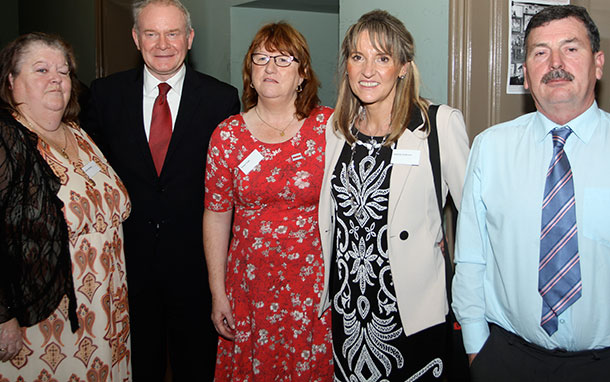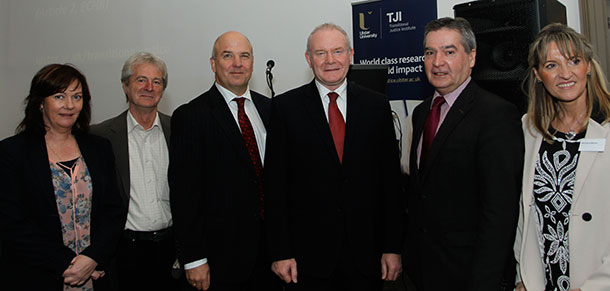1 December 2014 Edition
‘There can be no impunity’
European Human Rights Commissioner warns Britain that excuses about lack of money for legacy investigations are unacceptable

• Deputy First Minister Martin McGuinness and Martina Anderson MEP with relatives of nationalists shot dead by pro-state forces: Maria McShane, mother of Gavin McShane shot dead by loyalists; Briege Voyle and John Taggert representing the Ballymurphy Mas
What Article 2 says . . .
THE European Court of Human Rights (ECHR) regards Article 2 as “one of the most fundamental provisions of the European Convention on Human Rights”.
Article 2 of the European Convention on Human Rights states:
Everyone’s right to life hall be protected by law. No one shall be deprived of his life intentionally save in the execution of a sentence of a court following his conviction of a crime for which this penalty is provided by law.
Deprivation of life shall not be regarded as inflicted in contravention of this Article when it results from the use of force which is no more than absolutely necessary:
(a) In defence of any person from unlawful violence;
(b) In order to effect a lawful arrest or to prevent the escape of a person lawfully detained;
(c) In action lawfully taken for the purpose of quelling a riot or insurrection.
According to the ECHR, the state’s obligation does not stop at protecting life; it also requires the state to carry out an effective official investigation.
WITHIN A WEEK of European Commissioner for Human Rights Nils Muiznieks telling a Belfast conference that Britain cannot avoid its responsibility for legacy issues, the British Government circulated a paper complaining of the financial costs of dealing with the past.
The NIO paper, ‘leaked’ on Wednesday 12 November, was given to the five Executive parties involved in the Stormont talks process and claims that it costs £50million annually to address legacy issues.
Reacting to the paper, Sinn Féin MLA Gerry Kelly, a delegate at the talks, dismissed the document:
“The British Government has had no problem finding monies and extra resources to obstruct efforts to uncover the truth about state killings and collusion.
“They have done this through injunctions and destroying documents and evidence. They have also refused to disclose information requested by the coroners’ courts and the Police Ombudsman’s office.
“They have refused to hold an inquiry into the murder of solicitor Pat Finucane and continue to withhold information into the Dublin and Monaghan bombings. Most recently we have seen the shelving of the inquiry into the killing of 14 people in Derry on Bloody Sunday.
“The European Commissioner for Human Rights has made it clear that the funding issue is the responsibility of the British Government,” stressed Kelly.

• Sinn Féin’s Jennifer McCann MLA, Bill Rolston, Nils Muiznieks, Martin McGuinness, Professor Richard Barrett Vice Chancellor of Ulster University and Martina Anderson
Kelly’s criticisms echo those of the Council of Europe Commissioner for Human Rights, Nils Muiznieks, who told a Belfast conference on 6 November that Britain has obligations under the European Convention and “there can be no impunity”.
The families of IRA Volunteers Gervaise McKerr, Patrick Kelly and Pearse Jordan and Sinn Féin activist Patrick Shanaghan won a landmark decision when, in May 2001, the European Court of Human Rights found Britain had violated the right to life guaranteed by Article 2 of the European Convention on Human Rights.
Rather than fulfill its obligations under Article 2, however, Britain refused to carry out “effective official investigations” and this refusal was the focus of the conference in Belfast organised by the University of Ulster’s Transitional Justice Institute.
European Commissioner for Human Rights Nils Muiznieks was the keynote speaker at the event, titled ‘Right to Life and Dealing with the Past in the Context of Article 2 of the European Convention of Human Rights’.
The Human Rights Commissioner warned Britain that it cannot “devolve its responsibility to the Assembly” and that “the violations that took place during the ‘Troubles’ took place primarily during a period of direct rule”, adding that the Westminster Government cannot divest itself of “investigatory responsibility of funding responsibility” for investigations.
To make it clear, he added: “Excuses about lack of money are unacceptable.”
Costing too much?

BRITAIN’S claim that investigating the past would cost too much stands in stark contrast to the huge sums of money it paid out to its military forces over the years.
Compared to the £340,000 needed to fund the Police Ombudman’s investigations into incidents such as the Loughinisland Killings, and the accusations of collusion between the UVF and RUC, the British Government has paid out:
£500million – for Patten RUC retirement scheme
£250million – in hearing loss compensation for 10,000 RUC/PSNI personnel
£250million – pay-off for UDR/RIR soldiers
£20million – for RUC Reserve
£100million – for retiring/rehiring scheme involving former RUC/PSNI members
£70million – pay-off for prison warders




